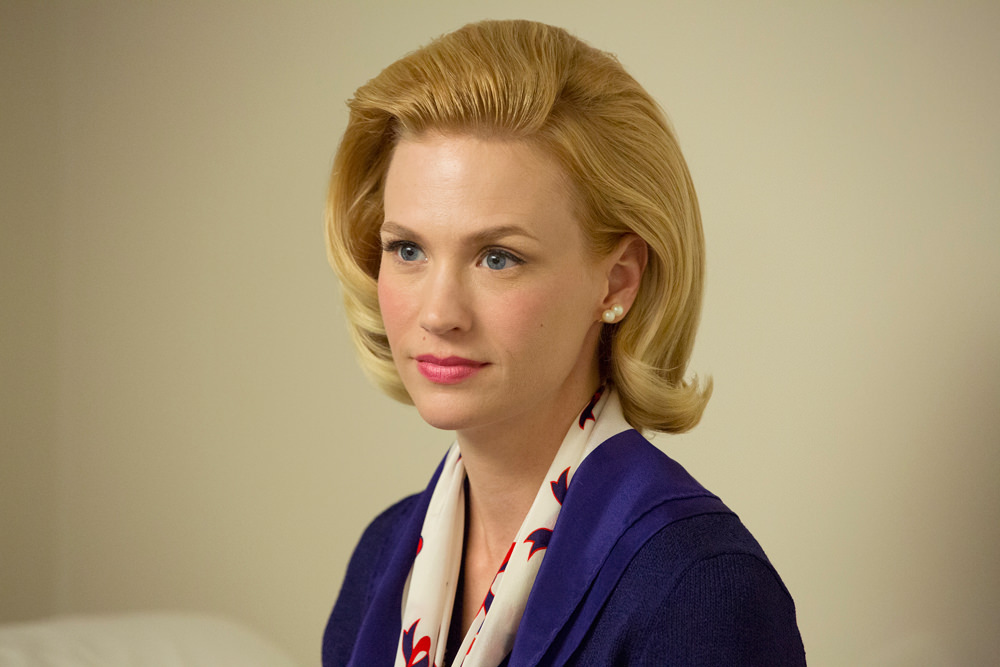 January Jones in “Mad Men” on AMC
January Jones in “Mad Men” on AMC
Well Happy Goddamn Mother’s Day from Matthew Weiner. Oh. Here’s your heart. It seems to have been ripped from your chest recently.
We don’t know what surprises us more; that Weiner is choosing to wrap up most of the main characters’ stories rather definitively or that he’s choosing overt heartstring-tugging and somewhat sudden turns of character as a way of doing so. But even as we were surprised by these unexpected developments , they still had such a sense of inevitability about them; such a feeling of “Of COURSE this was how it was going to happen.” We may never see who Don marries next or the life of the Campbells of Wichita (although please GOD, let that be a new spinoff series announced after the finale airs) or Peggy’s name on the lobby wall or Sally learning to fill her mother’s shoes while marching to the beat of her own drum, but it doesn’t matter, because we’re getting such emotionally satisfying – and more importantly, thematically appropriate – wrapups to each character’s story. Yes, even Betty’s tragic end.
“I’m younger than you,” teased Betty to Don last week, “Always have been, always will be.” Just one of many astonishingly poignant truth bombs Betty dropped as she walked off stage. Was it an inevitability that she die of cancer before the series ended? Maybe. In retrospect, it seemed inevitable that someone would, given the insane amount of smoking these characters have been doing for the last decade. Certainly, there was plenty of foreshadowing in the deaths of Anna and Rachel from forms of cancer. In fact, cancer has hung over the series for years, almost acting like a character in itself. After all, the pilot episode was almost entirely about Don trying to come up with a way to sell Lucky Strikes in light of all the growing panic about the carcinogenic qualities of cigarettes – and succeeding spectacularly, initially selling the audience on the idea that he’s a rockstar creative man. It’ fitting somehow that as the story ends, the universe is making him pay for that success by having that very disease claim the lives of some of his greatest loves. Cancer, it seems, has been stalking Don’s life for years. Hello darkness, my old friend.
Don’s storyline is playing out exactly as everyone assumed it would (barring those people who thought he was going to plummet off the side of a building, of course) and Weiner’s not even attempting subtlety at this point. He’s fixing typewriters and Coca-Colaaaaa dispensers in exchange for food and board, trading sob stories with other old drunks, getting rolled for money, and ultimately, sitting on the side of the road with all of his possessions in a paper bag. He’s fully a hobo, and just as cancer has been stalking Don all these years, Don himself has been feeling the pull of the road calling to him this entire time. What makes this inevitable turn work is the realization that Don, for once, seems to be quite aware of what it is he’s doing and why he’s doing it. That satisfied smile at the end when the grifter kid drove away in his Cadillac – the very last vestige of his old life – proved that Don knows he’s a hobo. Unlike the other times he flirted with running away, he’s fully committed to it this time: no job, no home, no wife, no company, no car. Of course, he’s a hobo with essentially unlimited cash at his disposal, which tends to make it a somewhat easier take on the lifestyle. But make no mistake, his old life is gone. “I was in advertising,” he says to the young con man who desperately wants to get out of his backward town.
Don has always taken a shine to drifters and depressed or damaged young men, from Suzanne Farrell’s epileptic brother, to that shell-shocked soldier in Hawaii, and even to a depressed Glen Bishop, who asked him at just the right moment why the things you want in life turn out to be disappointments, prompting Don to hand over the keys of his Cadillac to him and letting him take the wheel. This grifter kid is just another in a long line of young men that remind Don of himself. He just happened to be the lucky one standing next to him when Don decided to give away his last – and in retrospect, most prized possession. Don took some time agonizing over whether or not to buy that Caddy because he didn’t believe he truly deserved it. When he finally bought it, it was a declaration of sorts. “I’m Don Draper and I deserve this.” Giving this possession away – to another man trying desperately to define himself apart from his own past – was as declarative and definitive an act as Betty saying the words “I love you” to her daughter. He’s truly no longer Don Draper.
Was it inevitable that Pete and Trudy reunited? Maybe not, but we admit, it was something we really wanted to see, partially because when they were functional (which was rare in their marriage, to be sure) they made a fantastic team, which isn’t something you can say about many of the other couples in this story. There’d be no such satisfaction if Don and Megan reunited since it was so obvious that they were not meant to be together. And a Don/Betty reunion would have felt like a huge step backwards for both of them. But Trudy and Pete? That just seems right. All the main male characters have paid enormous prices for their philandering and the crappy way they treated their wives, but no one was put through the wringer on this front more than Pete, suffering humiliation after humiliation for his years of never being satisfied and never understanding the value of what he already had. Sure, Don’s been punished a lot for his transgressions, but Pete truly hasn’t had much personal happiness in his life at all since he blew up his marriage. He’s only just now being depicted as having any sort of relationship with his own daughter, unlike Don who, despite his transgressions, has always enjoyed the benefits of children who more or less adore him (with some bumps along the way where Sally rightly hated him, of course).
Besides, the failure of the Campbell marriage revolved around Pete’s own rage and sense of entitlement based on how he was raised (by a distant, philandering father who died in a plane crash) and his attachment to life in the city his family believed they helped to found, with accompanying disdain for the suburban lifestyle Trudy wanted to pursue. You probably couldn’t come up with a better way of addressing and wrapping up all these issues than by having Pete, after a decade of proving himself professionally over and over again, accepting a dream job of working for an airplane manufacturer, packing his wife and daughter up, and moving them far away from New York, Cos Cob and all the distractions and temptations that blew things up the first time. He gets what he always wanted: To be a big fish in a small pond, with his family by his side, enjoying the benefits of his family name (Lear wanted an “old Knickerbocker” in the job) while no longer having to live in a New York City that had become, in Pete’s words, “a toilet.”
But have these character endings been earned? Have we seen Betty and Pete grow to the point that we can accept their suddenly evolved natures this episode? We’ve been saying for some time now that Mad Men is a show about how people can’t change the fundamental natures of themselves and that the best they can do is figure out their own limitations and patterns of behavior and learn to work within those paradigms. That’s pretty much how growth works in real life. Peggy has always been, in our minds, the model for this sort of thing. She took her essential self – that shy, awkward Catholic girl from Bay Ridge who had a knack for observing people, and went on a journey, making many mistakes along the way and learning who she was and what she was capable of; becoming in the end a bold woman who made her considerable career based on that knack for observation and knowing what it feels like to be on the outside of something and wanting it desperately. She’s grown and changed in many ways, but her essential nature remains the same; a perpetual outsider who became a rockstar.
Betty’s had a lot of scenes over the years where her petulance and childlike nature made her hard to take, but in our minds, one of the worst scenes was when her own father tried to talk to her about his funeral plans, knowing his death was imminent. She wouldn’t hear a word of it. “Can’t you keep this to yourself?” she asked him coldly. “I’m your little girl.” Here she is, eight years later, as emotionally mature a woman as anyone could ask for, accepting her own death and forcing her own little girl to handle the plans for her upcoming funeral. And yet, despite all the ways Betty has grown and changed over the years, her final words to her daughter were mostly concerned with how she wanted her hair, what gown she wanted to wear and what lipstick she wanted applied to her. Betty was able to change to the effect that she was able to celebrate her daughter’s uniqueness and tell her she loved her – but she had to do it in a letter concerned largely with appearances and coldly listing a series of demands. That’s pure Betty Hofstadt. She couldn’t perch on Sally’s bed and give her a hug and talk about love and looking down from heaven. That’s not who she is and that’s not what that scene was for, in Betty’s mind. It was Betty’s last declaration of self. “I’ve fought for plenty in my life,” she tells Sally, Now do as I tell you. And make sure I look pretty. She’s grown, but she’s still the Betty we’ve always known.
Similarly, Pete’s turn toward introspection and his realizations about all the many ways he’s screwed up his life is a wonderful thing to see. There was no line more indicative of the massive shift this character made than the very last one he uttered in this episode, one full of uncharacteristic optimism and good will: “Good morning.” Like Betty’s final sob-worthy “I love you. Mom” it was a line that summed up all the growth this character has made. He’s always been sour, petulant and rudely entitled, but now he’s realized the truly important things in life. This change has been coming and building slowly for some time, but it’s extremely true to Pete’s nature that what finally prompted him to make this leap was a dream job offer, loaded with money, perqs, and the kind of respect he always felt was his due. Remember when he couldn’t get it up for a hooker until she called him her king? He couldn’t have asked for Trudy back without someone else confirming his worth to him at this level. Had he stayed a Vice-President at McCann, he would have fulfilled Don’s pilot episode prediction that in ten years he’d be nothing more than a mid-level executive with a corner office and “a little bit of hair, who women go home with out of pity.” Now he’s free to become the person and live the life that will make him happiest: Pete and Trudy Campbell, King and Queen of Wichita.
As an aside, it’s interesting to note how much financial success is playing into the final stories of all these characters. Don’s got more money than he knows what to do with, Joan exited her career a millionaire, Peggy’s on track to quadruple her salary in a few years, and Pete landed a job that’s destined to make him a very wealthy man. This too seems inevitable. After all, what is advertising but the religion of capitalism? These characters have been praying at that altar for years. And while there are plenty of disappointments in the way this story is ending, that’s one area where everyone’s prayers seemingly got answered.
It remains to be seen what Don’s going to become; what lessons he’s learned and how he’s going to apply them to whatever the next stage is in his life. Once again, he got punished for telling his deepest secret. Betty left him when she found out how he really was. The partners all but fired him. And now, his fellow soldiers beat him with a phone book, after he opened up to them, once again reinforcing the idea to Don that it’s better to just not tell people the truth. But has he changed? When he stopped to take in that brunette with the book sunning herself poolside, it seemed like a moment where he may have realized his own patterns and weaknesses, just as the grifter kid made him realize the high cost he paid for cutting himself off from his own past and name. We’ll make no predictions as to where he’s heading and what is ultimate end in this story to be, but we’ve never seen a grin like the one on his face when he sat at that bus stop and realized he was truly free. Whatever else happens with Don, his journey has been long and hard, but it’s clear to us that he’s come to a form of self-acceptance that didn’t seem possible even a few years ago. Granted, that’s all about to come crashing down when he finds out he’ll have to be the sole parent to his children, but that’s the great tension heading into the finale. Don’s happy and where he wants to be, but life clearly has other plans for him. Who’s going to respond to the call? Will Dick Whitman hit the road or will Don Draper come home and be a father to his children?
If you’d like to hear our interview with Mad Men’s Costume Designer Janie Bryant, you can go here (4/3/15 podcast).
For more discussion on your favorite shows, check out our TV & Film forum.
[Photo Credit: Michael Yarish/AMC]
Mad Style: Lost Horizon Next Post:
Mad Style: The Milk and Honey Route
Please review our Community Guidelines before posting a comment. Thank you!



